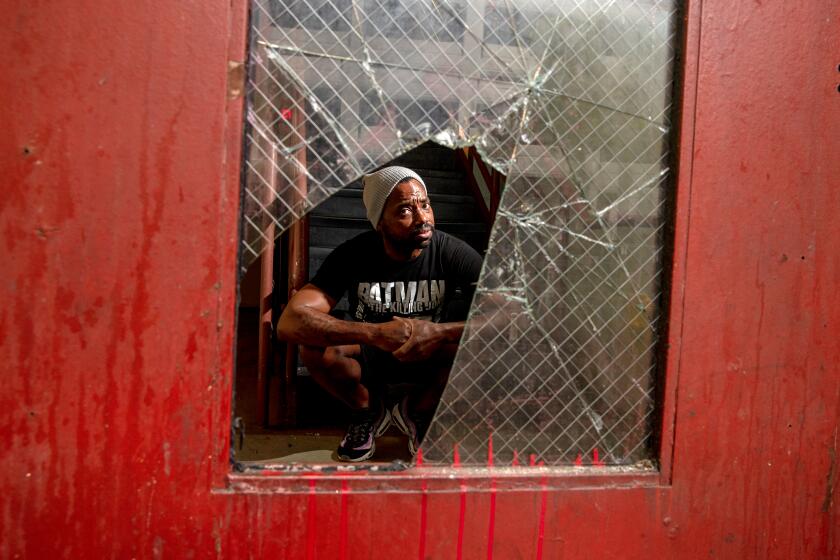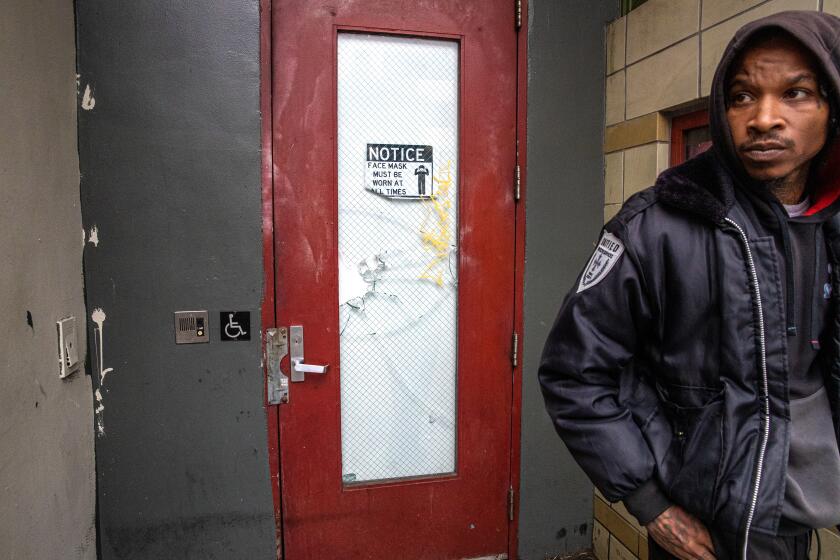Fallout of Skid Row Housing Trust collapse big and small: broken promises, homelessness, lost dentures
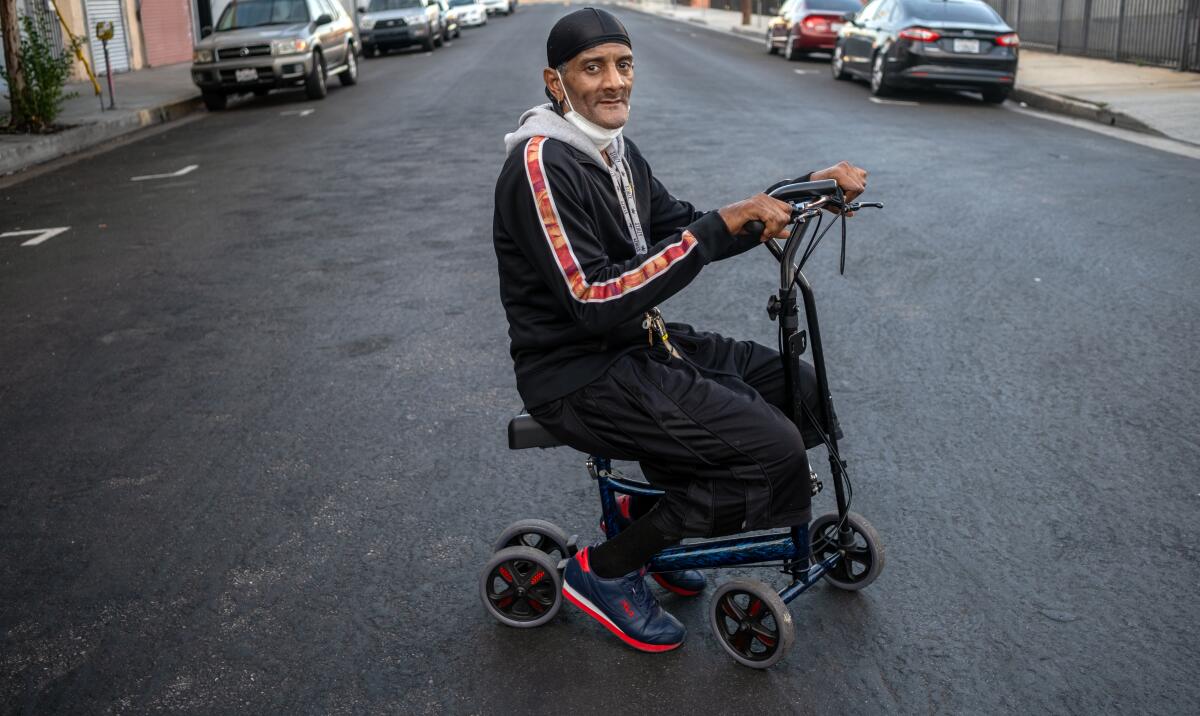
- Share via
Nearly eight months after a fire left their downtown single-room occupancy hotel boarded up and uninhabitable, the building’s 22 former residents remain scattered and scarred.
Some have become homeless. Others are unaccounted for. Another group remains in temporary housing, chafing under a nightly curfew and a no-guest policy — rules that didn’t exist at their previous residence, Skid Row Housing Trust’s Dewey Hotel. Some who have been relocated to different trust properties said they only agreed to do so out of fear they’d otherwise be thrown onto the streets.
Like other former Dewey residents, Marvin Danzey III said in the wake of the fire he’d been promised a subsidized housing voucher that would allow him to choose a new place to live. But no such voucher has materialized.
Danzey still hasn’t even been allowed back inside the Dewey to collect belongings he had to leave behind. Most of his clothing. Family photos. His dentures.
“We feel like we’re being punished for our building being set on fire,” said Danzey, 58.
The tumult faced by former Dewey tenants provides one of the most striking examples of the ongoing disarray caused by the collapse of Skid Row Housing Trust, once the largest landlord of last-resort housing in the neighborhood at the epicenter of L.A.’s homelessness crisis.
In March, just six weeks after the Dewey fire, Mayor Karen Bass and other city leaders petitioned a court to place the property and 28 other buildings owned by the trust under a receivership. Trust officials said they could no longer pay their bills or keep their more than 1,500 residents safe, and the mayor said the drastic move would protect the trust’s tenants from further hardship.
The Skid Row Housing Trust was a model for nonprofits housing homeless people in Los Angeles. Behind the scenes, it was imploding — leaving tenants in squalor.
Trust interim chief executive Joanne Cordero declined an interview request to discuss the former Dewey residents, saying that she’s no longer involved with any property or resident-related activities. Since the fire, numerous public and private entities have managed the tenants’ situations, but no one has taken overall responsibility for them. City housing and county public health officials provided The Times with conflicting details on where former Dewey residents were living now.
Ann Sewill, general manager of the Los Angeles Housing Department, said that after the Dewey was deemed uninhabitable its residents were no longer officially considered Skid Row Housing Trust tenants. Nevertheless, she said, her agency and others have continued to provide ex-Dewey residents with subsidized living arrangements and plan to keep seeking permanent housing until all receive it.
“I in no way want to minimize their experience,” Sewill said. “But I would imagine that it’s almost impossible to feel pleased when you’ve been displaced from your home by a fire. And dealing with bureaucracy is dealing with bureaucracy.”
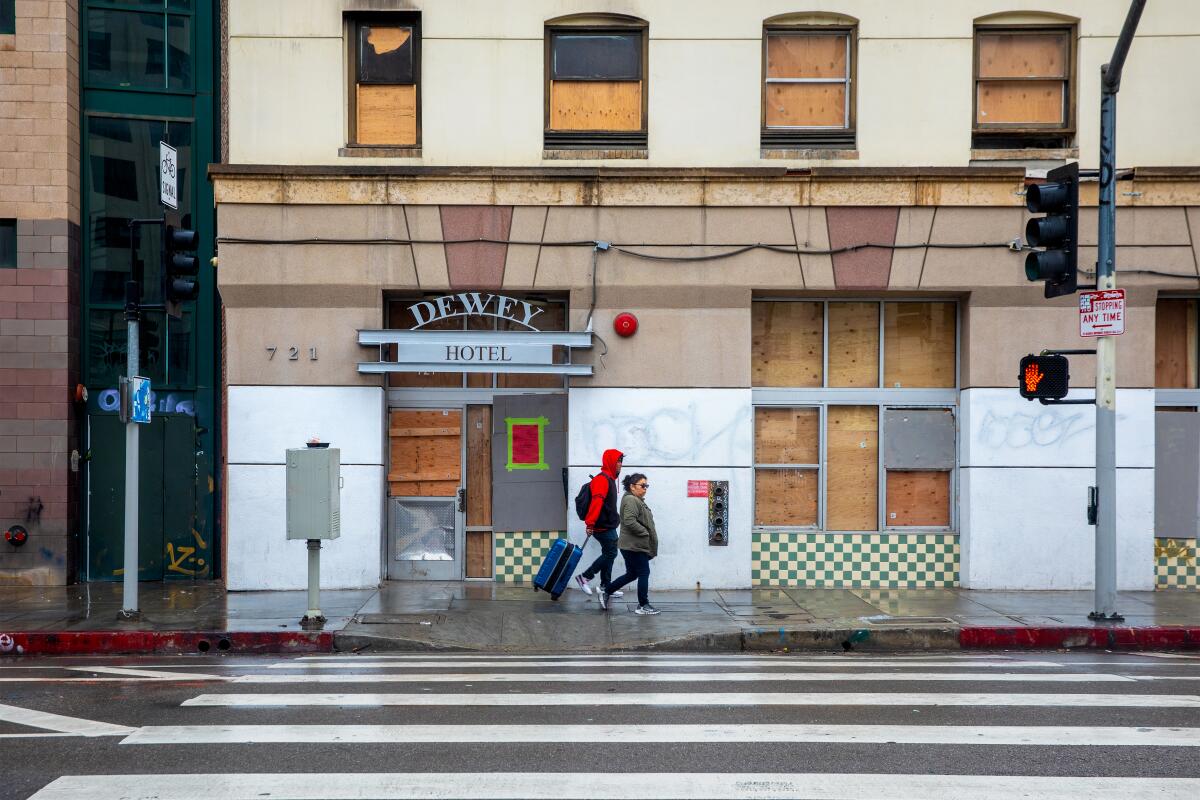
By the time of the fire in February, half of the Dewey’s 43 units were empty. Many remaining residents had lived there for years. When they first arrived, multiple former tenants told The Times, the building was safe and they received services to care for various disabilities.
But about five years ago, residents said, everything began to change. Tenants worried about stabbings and shootings. The elevator stopped working. Danzey said the toilet handle in his room broke and was never repaired, forcing him to flush by pulling the chain in the tank.
The Dewey’s decline was part of larger problems across the trust’s portfolio. Unstable leadership, financial mismanagement and a failing business model for the nonprofit’s single-room occupancy buildings led to a cash shortage and deteriorating conditions in its buildings.
A Los Angeles Fire Department arson investigation found that the fire that resulted in the Dewey being declared uninhabitable was set intentionally. It was the last in a series of blazes over previous weeks, residents said. At the time, the city housing department was scrutinizing widespread mold they believed was caused by a leak in the Dewey’s roof. Trust officials had already gone public about the nonprofit’s impending failure.
The judge’s ruling comes two days after three people died of drug overdoses in an apartment unit at a Skid Row Housing Trust building, 649 Lofts.
After the fire, five of the Dewey’s 22 tenants left, Sewill said. The remaining 17 were relocated to a Vagabond Inn near USC.
Becky Schlikerman, a spokesperson for the county Department of Public Health, said the county responded to a “humanitarian issue” by providing temporary housing that maintained former Dewey residents’ connections to healthcare.
“This housing solution, funded by Los Angeles County, was used as a stopgap to ensure vulnerable individuals had an immediate place to go,” Schlikerman said in a statement responding to written questions from The Times.
Living at the Vagabond came with strict rules, including a 10 p.m. curfew and a prohibition against having guests.
Abiding by the regulations became more difficult over time. The site is usually used for stays of less than two weeks. In late September, former Dewey tenant Dwight Simril’s electric wheelchair needed repairs that stretched for days. He grew depressed staying alone in his room without anyone allowed to visit him.
“I’ve just been in here,” said Simril, 68, from the Vagabond via telephone. “The walls are starting to close in on me.”
Four former Dewey residents were removed from the Vagabond for violating the rules, Sewill said. One is homeless but remains connected to a caseworker and another is living in a shelter, she said. She did not know the status of the other two, but said all were still being offered case managers and ultimately the opportunity to receive permanent housing.
Sewill said tenants who were put out included those who stole property or threatened others at the Vagabond with a knife. Tenants say some were expelled solely for violating the guest policy, and other situations were more complicated.
Daniel Fierro said because he wasn’t allowed to have guests at the Vagabond he was speaking with a friend on the street through his room’s window. Fierro said he threw a hotel ottoman out the window for his friend to sit on, and was removed the next day after being accused of stealing the furniture. He says he had found it discarded on the lawn.
Fierro spent the next several months living in his car with his two Chihuahuas, sweating in the summer heat.
“It’s so hard to sleep in a PT Cruiser,” said Fierro, 58. “It’s such a small car that I literally have to open the door to let my feet stretch out. Other than that, I’m in the fetal position.”
Sewill, from city housing, and Schlikerman, from county public health, provided The Times with different accounts of the former Dewey tenants’ statuses. Sewill said eight Dewey tenants had since been given permanent housing at other Skid Row Housing Trust buildings and five remained at the Vagabond. Schlikerman said five tenants had been given permanent housing while six remained at the temporary site. Per Schlikerman, one tenant left the temporary site of their own accord, while another died after being hospitalized for a prior illness.
The conflicting figures trouble Pete White, founder and co-executive director of the nonprofit Los Angeles Community Action Network. White’s organization, which advocates for Skid Row residents, met with former Dewey tenants over the summer and was appalled at their treatment.
Public agencies, the trust and the receivership should have kept better track of the tenants, quickly returned them to permanent housing and compensated them for any losses, White said. Instead, the former Dewey residents had their legal protections as tenants — including the ability to defend themselves in formal eviction proceedings — negated, he said.
“The tenants are afterthoughts,” White said. “Their actual rights are not considered.”
Mark Adams, the receiver responsible for overseeing 1,500 tenants in Skid Row, resigned Thursday after a turbulent three-month tenure.
Schlikerman said the county will continue to fund the temporary housing for the former Dewey tenants and there’s no timeline for them to leave.
But that’s not what former residents have been told. In August, some were taken to the Lincoln Hotel, another property owned by the trust, with the hope that they would agree to move there. A video shot by an existing Lincoln tenant shows a caseworker from the nonprofit AIDS Project Los Angeles telling former Dewey residents that they had to get out of the Vagabond in two weeks.
“I don’t know what the repercussions are,” the caseworker said. “But I know one thing: that we have to make a move.”
Terry D. Goddard II, who leads AIDS Project Los Angeles’ housing division, said the false deadline came from a meeting with officials from the city housing department, which contracts with his organization, and other government agencies.
“What we did was in good faith conveying what we were told,” Goddard said.
Danzey and Rodney Charles, another former Dewey resident, both said they moved to the Lincoln after the tour despite reservations about the building’s conditions. They worried they would otherwise become homeless.
“I wasn’t supposed to be here like this,” said Charles, 39. “I was told I was supposed to be getting something better than what I had before.”
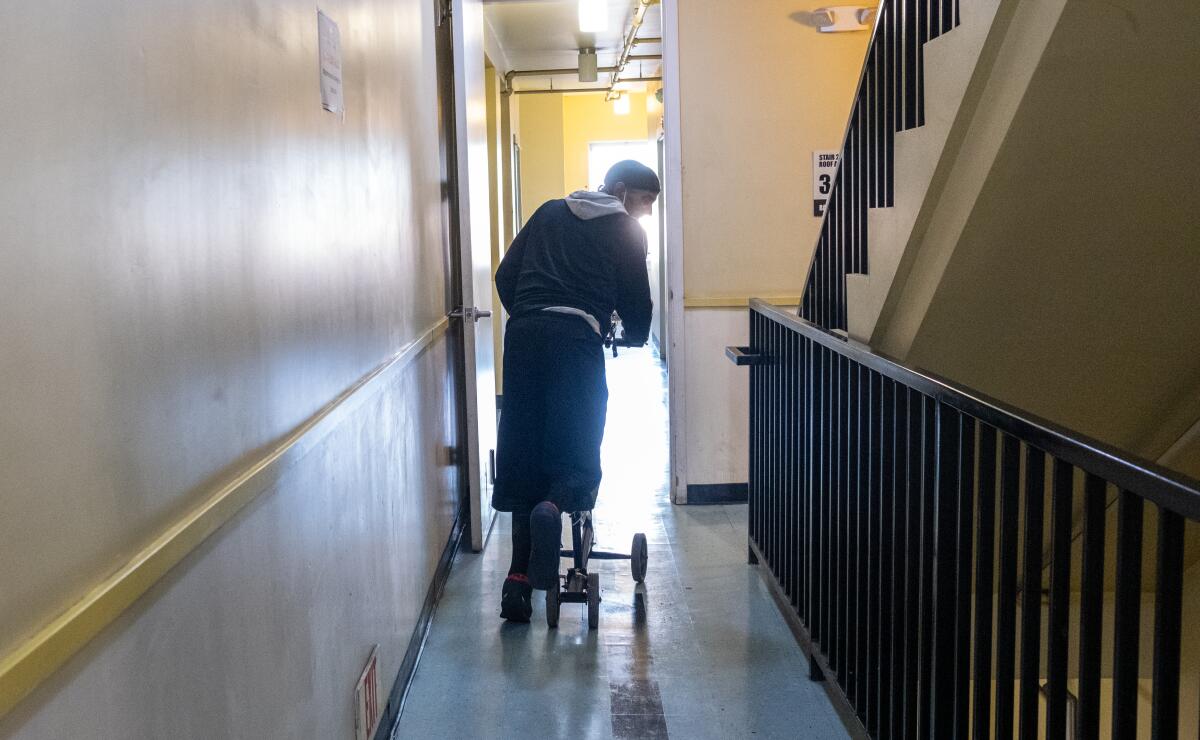
Fierro, the former Dewey resident who had been expelled from the Vagabond, recently reconnected with AIDS Project Los Angeles caseworkers. Exhausted from living in his car, Fierro said he hoped to move into the Lincoln this week.
On a recent afternoon at the property, Raynard Lang watched water drip from exposed beams above his bathroom after the ceiling had collapsed four days prior. He said he’d been complaining about leaks from the unit above him for two months before the incident and knew the ceiling was going to fall.
“I think the whole building needs rebuilding,” said Lang, 55. “The whole building.”
The purpose of the receivership is to stabilize the trust’s properties so they can be turned over to other homeless housing providers. The city’s first choice as receiver, Mark Adams, resigned under pressure in June after only three months on the job, following acrimonious disputes with city officials over his management and financing plans.
Adams’ replacement, Kevin Singer, has resolved 239 housing authority and city code enforcement violations across the trust’s portfolio since his appointment in July, though nearly 650 remain, according to a report from the city housing department. Seven trust properties have exited the receivership, and are now being operated by PATH Ventures and LA Family Housing.
But the Lincoln and the Dewey are among a dozen of the trust’s oldest and most dilapidated buildings that city officials believe will be hardest to rehabilitate. With the city’s permission, the Southern California Assn. of Non-Profit Housing, an umbrella group representing affordable housing developers, is assessing the 12 buildings to determine how much money will be needed, including from the state and city, to remodel the buildings and how long it will take to do so, Sewill said.
While the Dewey has been shut down, break ins and reports of squatters have been frequent. Former tenants are clear-eyed about the fate of their possessions inside.
“My understanding is I should forget about it,” Simril said. He left his high school and college diplomas, most of his clothes and pots and pans in the Dewey. “That’s a pretty big pill to swallow.”
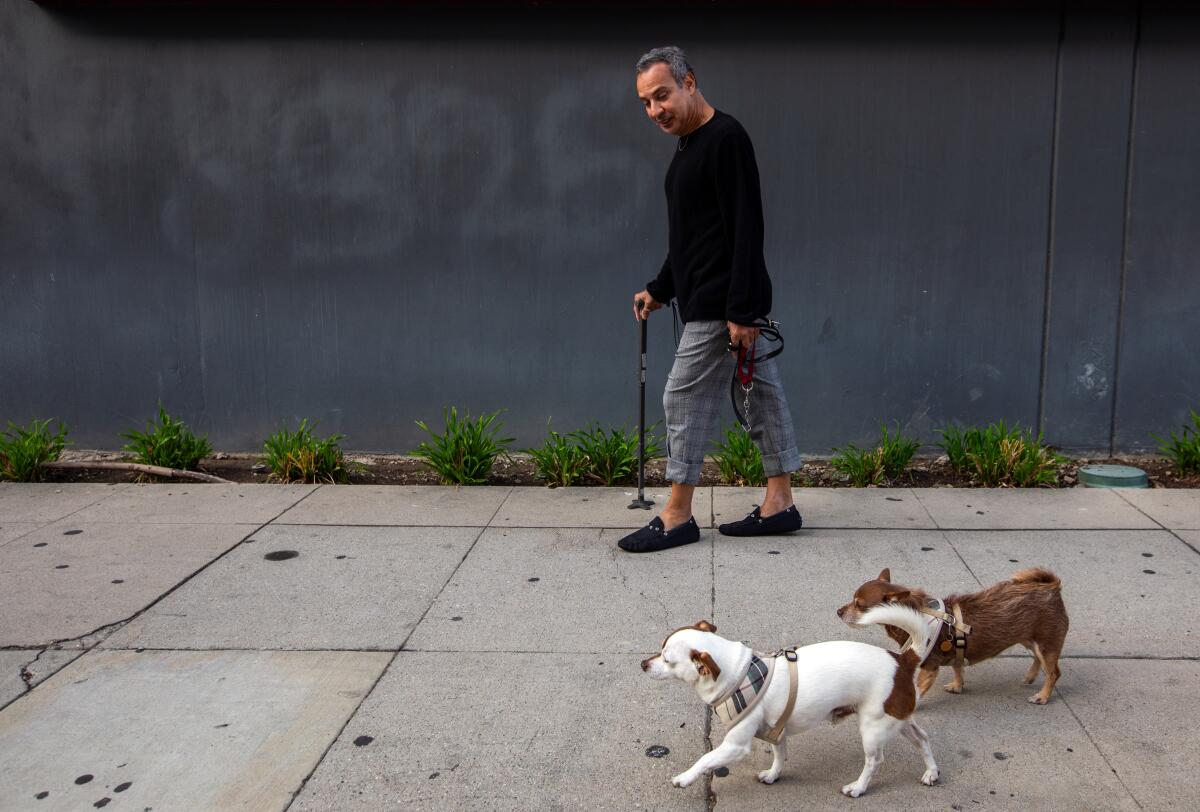
Some former Dewey tenants are holding out to leave trust properties entirely. Six former residents interviewed by The Times all said they were promised a voucher that would allow them to rent housing on the private market with a subsidy rather than one tied to living in a particular low-income building.
Javier Mejia, 58, rejected an offer to live at the Lincoln because he uses a cane to walk and believed the surrounding neighborhood, in the southeast end of Skid Row near warehouses and industrial facilities, is more dangerous than at the Dewey, which sits among downtown restaurants and high rises.
“I want to be able to walk my dog and not watch my back, worried somebody’s going to harm me,” Mejia said.
Most recently, Mejia’s caseworker floated the possibility of vouchers for him to live in Long Beach or Pasadena. He’d be happy to go.
“Move me anywhere in L.A. except for downtown,” Mejia said. “I don’t want to be in any of the Skid Row Housing Trust buildings.”
More to Read
Sign up for Essential California
The most important California stories and recommendations in your inbox every morning.
You may occasionally receive promotional content from the Los Angeles Times.

